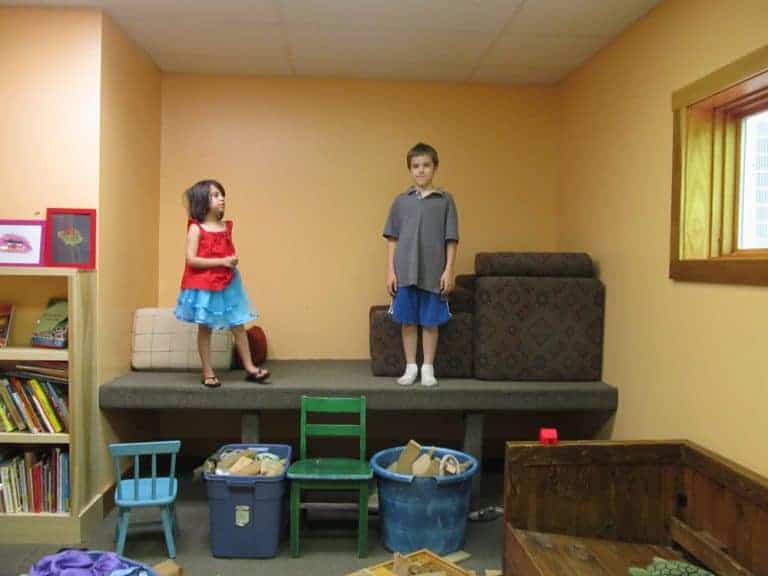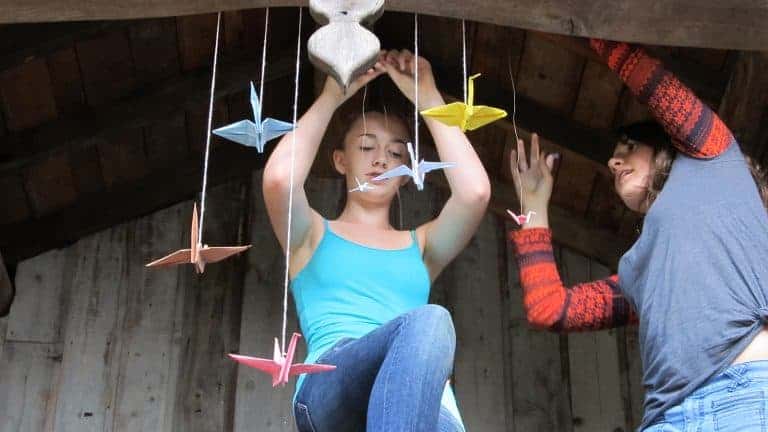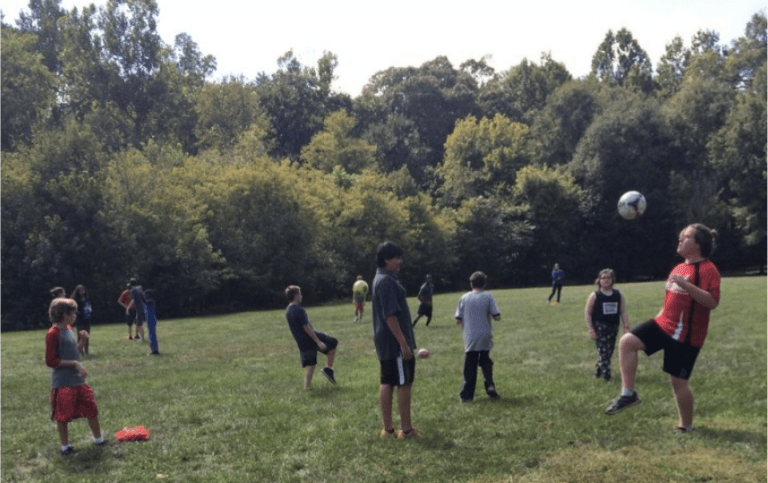Staff Member Mark McCaig’s Berlin Speech (Part 1)
(In May, 2012, Ting Schule, a Sudbury school in Berlin, invited Fairhaven staff member Mark McCaig to speak at a public event. Here is the first half of his remarks.)
Who Will I Become Today? Role-Playing as a Way to Understand Fairhaven School
“The essential human characteristic is creative imagination. It enables us to master our environment, to overcome the limitations of our brain, our body, and the material universe. It is the “something more” that distinguishes us from the upper primates.”
Richard Courtney, from Play, Drama, and Thought
For almost all of human history, people have grown and learned by doing. The idea that schools can identify everything a child needs to learn is a very new idea, and I would say a radical one. Sudbury schools like Ting Schule and mine, Fairhaven School, have been established as an antidote to the prevailing emphasis on curriculum and testing. At our schools, we prioritize the process of education over the content of education. Because of this, our schools foster precisely what Courtney calls “the essential human characteristic”: creative imagination. One of the ways to understand a Sudbury school is to consider this idea by recognizing that what our students do all day is play roles, and in doing this they harness the remarkable power of creative imagination. Albert Einstein said it well: “Imagination is more important than knowledge.”
Most days when I arrive at Fairhaven School, a group of girls has taken over the room we call the lounge. They have turned the furniture on its side, setting up an imaginary house or fort. Usually, I don’t come in the room. When I do, they politely give me that look. You know how it feels when you enter a room and you’ve interrupted something that is very private, serious, and important? That look. There’s something in the air that feels precious, so I say good morning and leave them to their game. Usually they’re playing House, with somebody as the mother, some daughters, maybe a father. Sometimes it’s puppies, or office. Why would I describe their activity as serious? Isn’t it just a game? It’s a school, so isn’t the serious work when they decide to take classes?
What these girls do every day is what I’m going to call role-playing. If you want to understand Sudbury schools, you must understand this concept, because this is what the students at Fairhaven School and Ting Schule do all day. They play different roles. Isn’t this also what we adults do? Take me, for example. In my life, I am a father, a husband, a son, an uncle, a teacher, a bookkeeper, a school spokesman, a poet, a gardener, a person with diabetes, an astronomer, an athlete, and a birdwatcher. That is today’s list. Each of you could make a similar list, right? In this postmodern world, people seem to be doing more and more different things. People are playing more and more roles, and schools should be preparing young people to thrive in this world. In English, we used to call someone who was accomplished at many things a “Renaissance Man.” Does that translate? Today, schooling and training seems more intent on specialization, at precisely a time in cultural and economic history when the ability to do many things well (to play many roles) is what I think will best prepare someone for the twenty-first century.
So if we accept the framework that our societies expect, maybe even require people to “wear many hats” (another English idiom) throughout the day, this is what schools should be preparing young people to do. Going back to the girls, I know that inevitably in their games, they switch roles. As in, “okay, now I’m the mom, and you’re the daughter,” or “I want to be the boss this time.” So, crucially, no one at Fairhaven School plays only one role! Sometimes these changes require negotiation and compromise, but they always require flexibility and adaptation. Are there more important attributes for success in life?
So now I’d like to explore some of the many roles students play at Fairhaven School and why this matters. Where I come from, people who want to be successful must be computer literate. Wander through Fairhaven School, and you will see many people on a variety of screens: some are on the school’s computers, some are on their own laptops, and some are on smartphones. Our students are wired, and they ride the wave of technology with ease. Many times I have a problem or question about computers, and when I do, I always ask somebody who is younger than me for assistance. The amount of time we as a society spend on screens is a seismic shift, and perhaps not all good. One could argue that computers have bettered our society in a thousand ways, and one could argue that computers have worsened our society in a thousand other ways! Take Facebook as an example: has it truly brought people closer together or has it isolated us more? Can people actually connect by way of a computer? I cannot say. What I can say is that students from Sudbury schools may just be the ones answering these important questions, because they will be fluent in new media as it evolves. They may even be the ones providing the new solutions. In fact, three or four of our alumni who were avid computer gamers as students have now enrolled in the leading university for game design.
At Fairhaven School, in order to use anything that is expensive or dangerous (and computers are both expensive and potentially dangerous), you must become certified to use it. (Examples include microwave ovens, knives, tools in the shop, and the forest.) To use computers, you must pass a test. For older students, passing the test is relatively easy. For younger students, they often must take the test multiple times prior to passing. For them getting certified becomes a rite of passage. A voluntary, democratic group called the Computer Corporation manages the school computers, and has done so since we opened in 1998. The School Meeting, which includes all students and staff, has oversight over the Computer Corporation.
For thirteen years, then, both the Computer Corp and the School Meeting have been writing and enacting policies, purchasing equipment, and generally regulating computers at Fairhaven School as they become more advanced and ubiquitous. Coincidentally, the age of our school mirrors the age of the Internet. Our students, then, have grown up completely familiar with the landscape of the Information Age. They have made some mistakes along the way (who doesn’t?) but they have been almost universally ethical citizens in the online world. The Computer Corp and School Meeting have had hours of debates regarding rules and policies about computers and the Internet, and I imagine more will come as the medium evolves. Nevertheless, at this point we have developed a culture that expects students to behave responsibly online, and as a result, they do just that. This is one of the basic truisms of Sudbury schools worldwide: the best way to develop responsibility in students is to give them responsibility.
I have seen students spend weeks and months on computers, and I’ve seen students boycott computers altogether. Many years ago, I saw one student pass a “No Screens Week” motion at School Meeting, just to see how the school felt without people on screens. One year we hired a student to make new computers for the school, and as I mentioned earlier, several of our graduates are pursuing degrees and careers in the computer field. In the end, computers and the Internet are here, like them or not. We feel very comfortable that our students have the experience, the knowledge, and the ethical sense to participate in a computer-dominated society; they are prepared to play that role.
Another story from Fairhaven School that exemplifies this concept of role-playing comes from this year, what we in America call “hot off the press.” Activities come and go on campus, depending upon who the students are, what’s happening in the larger culture, and who’s staffing the school. Several years ago, basketball was very popular at school, so much so that we actually formed a team and competed against other, much larger schools. We had fun and learned a good deal about ourselves and about other schools. Since then, students have played basketball some, but never with the same passion. Until this year. Suddenly, we had games where we could not accommodate all of the players with our one basketball hoop. When we had seven-on-seven, it was as much an experience in chaos as it was a ball game! Also, this year, we experienced a very mild winter. Since two winters ago we had more snow than we had ever had, the School Meeting had budgeted $2,000 in the Grounds line item for snow removal, yet this winter we had no snow and consequently used none of the money. So after some planning and discussion, the basketball players brought a purchase order to the weekly School Meeting to buy a new basketball system (a heavy-duty playground set with backboard, hoop, and galvanized steel pole.)
For those who may not know, Fairhaven and Ting Schule are democratic schools, with no Headmaster or Principal. Each student and staff member has a vote, and every week we collectively administer the school at School Meeting. This is a remarkable system not only for fair governance and good decision-making, but also for the growth and development of our students. The decisions we make at School Meeting are critical, important decisions, including how to spend money, whom to hire, all the rules of the school, and whether or not to suspend or expel students. As a side note, American public schools spend much time and money trying to teach students “critical thinking” and “problem solving” skills. Yet the problems students address there are almost always abstract, imaginary problems. If only these schools took a cue from the principles on which our nation was founded, and became democratic schools, I suggest that the young people of America (or Germany) would become much better thinkers and citizens! On the listserv where Sudbury school staff members communicate with one another, Sudbury Valley School founder Danny Greenberg recently reminded the participants that they founded their school in 1968 on the remarkable sentence written by Thomas Jefferson from the United States’ Declaration of Independence:
“We hold these truths to be self-evident, that all men are created equal, that they are endowed by their Creator with certain unalienable Rights, that among these are Life, Liberty and the pursuit of Happiness…”
Back to basketball. At 1:00 the week of the discussion, many more students came to School Meeting than usual. When the motion to purchase the hoop came to the floor, a one-hour debate ensued. Basketball player after basketball player discussed the need for another hoop and how much better a full-court game would be. They pointed out the extra money for snow removal. On the other side, the people who don’t play basketball talked about all of the other things we could do with the money: new computers, savings for a rainy day, new furniture. You get the picture. The ball players grew impatient, yet they waited their turns and stuck with the debate. One of my colleagues amended the motion to require the Sports and Fitness Corporation to raise funds for “at least 10% of the cost of the hoop.” (At our school, taking a cue from the Sudbury Valley School, the School Meeting has chartered several corporations to manage activities and funds at separate meetings. Examples include the Computer Corporation, the Art Corporation, the Kitchen Corporation, and the Theater Corporation. These, too, are run democratically, and serve for many students as places where they learn how to function in a democracy before they become regular participants at School Meeting.) The Sports Corp accepted the 10% amendment, and the motion passed. The ball players were ecstatic and met the next day to come up with a plan to raise the money. We decided to sell popsicles and ice cream bars, electing a Treasurer and sellers, debating all along the way how we should set up our business.
We have been selling now for two months, and have raised more than $200 thus far! Now we are deciding what our next purchase will be. Soccer goals? New balls? We shall see. As we have prospered, we have had to decide everything a small business decides: what’s a fair price? (we aim for 50 cents profit on each item.) Do we accept I.O.U.’s? (Yes at first, but the hassle of collecting debts was not worth the convenience of selling on credit.) As a Sports and Fitness Corp, should we offer healthy alternatives? (Yes, but the frozen juice pops are always the last to go. Junk food sells!) One month ago, a parent volunteer and I installed the hoop, and students have been playing ever since. The Sports Corp has also assumed responsibility for keeping the court area clean.
So what roles did these students play in this process? Athletes, citizens, entrepreneurs, and managers all come to mind. I am sure many more could also apply. This example also underscores a crucial element to these schools that Sudbury Valley School got right in 1968: a successful school must have equal parts freedom and responsibility. The School Meeting was wise, as it always is, in requiring the Sports Corp to pay for some of the hoop. For most people, embracing freedom is easy. But responsibility? Now that takes some hard work, and that is where much of the growth comes. Eleanor Roosevelt was correct: “With great freedom comes great responsibility.” Or check out this quote from Austrian psychiatrist Victor Frankl:
“Freedom is not the last word. Freedom is only part of the story and half of the truth. The positive aspect of freedom is responsibleness. That is why I recommend that the Statue of Liberty on the East Coast be supplemented by a Statue of Responsibility on the West Coast.”
So maybe we can think of the two basketball hoops at Fairhaven School as twin symbols of freedom and responsibility on our campus!
(End of Part 1)


